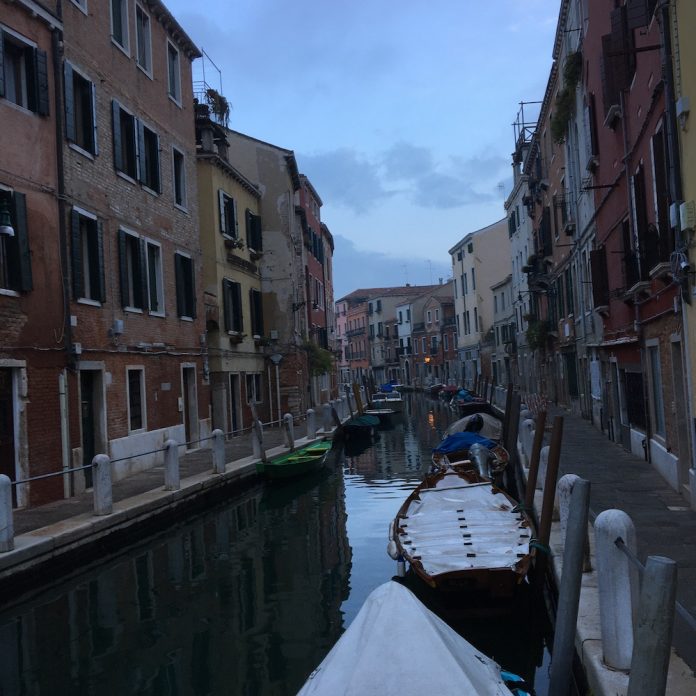*By Jing Wu
I left Macau to pursue my studies in Italy. I was studying in the Capital of the Country Rome for 9 months and in mid-September, the university sent me to Venice for a three-month internship as a part of the master’s curriculum.
After having already settled-in Venice and following an almost one-month quarantine, in early October I had tested positive for COVID-19.
Italy was one of the nations worst-hit by the global coronavirus pandemic in March. During the summertime, the epidemic slowed down but since then a second wave pandemic has spread again.
Italy has recorded the highest number of confirmed cases of Covid-19 in the past 24 hours with almost 25,000 new cases, according to the Ministry of Health Italy.
Since March, the World Health Organization guidelines (WHO) and Italian authorities issued several measures to respond to the crisis, including wearing masks, using sanitizer and social distancing are already compulsory in parts of daily life since in Italy. Most of the people follow the rules.
On October 3, the Lazio Region has issued the attached Ordinance which obliges people to wear face masks in public at all times, including outdoors, within the region. Violations can be punished with administrative sanctions starting from 400 euros.
At the beginning of October, I tested COVID positive in the public hospital in Venice. The weather has dramatically changed. I was feeling a little bit sick with a runny nose, headache limps sore and a little cough.
I did not take it seriously, considering I has not lost my sense of taste and runny nose. Since they are not considered usual COVID symptoms I thought I just had a cold and kept my normal routine.
The organization where I do my internship must measure the temperature before we work. and I asked for sick leave on October 2.
I was feeling fine on October 5 and went back to the office next day afternoon. I still remember that day my temperature was 36.3 degrees, so I stayed for work until I felt unwell again and left early.
My supervisor suggested I take a COVID test, just to be sure I did not have it.
I was still thinking that I probably just caught a cold, it was not a big deal and I was considering that the onsite working experience is precious for me due to the Covid-19 situation since the organization had scheduled each staff with only two work days or two and half days a week on-site.
I went to the public hospital UTAP Giustinian to make the COVID test. According to the Italian medical system, generally, every citizen has a family doctor. The family doctor provides a medical description and schedules the test appointment in the hospital.
I did not apply for a family doctor in Venice, and in my case, the medical staff just inserted my tax code to the computer system. After enrolment, I followed to another room to take the test, which is free of cost.
The whole environment was well sanitized, the staff are well equipped, examinees were following the rules, wearing masks and keeping social distance.,

My sample was sent to the central laboratory and I had to wait around 3-4 days to get the results. While waiting for the result, I was feeling better already but with a bit of fatigue, plus my neighbour was doing construction work, drilling from 8 in the morning until 5 int he afternoon so my mind did not feel that well.
While I was waiting at home for the result, the Government approved the extension of the state of emergency in Italy due to the COVID-19 pandemic until January 31, 2021 with the mandate to wear a mask anytime you leave your residence for the whole country.
The hygiene office (Ufficio d’igiene) put my data on the web, I just needed to insert the password to check. If the result is positive, it did not show on the web. I could not see my information on the web therefore I had to contact the hospital to receive the result.
The doctor informed me that I tested positive by phone, asked about my physical condition and I explained my situation to him.
“Stay at home, take more rest, if your situation worsens or you have fever serious cough call this number again, there will always be someone to answer you,” he added
I informed the news organization immediately and all staff made the test afterwards.
With the anxiety generated by the long waiting process plus the inconvenience to all my colleagues, I felt really ashamed and guilty, thinking that I had put everybody at risk.
Luckily, they all tested negative.
Less than a week since the last legislative decree came into effect on October 14, the local Government also issued an additional decree, which tightens national measures for the period of October 19.
A few days later, the hygiene office contacted me to schedule my second COVID test on October 16. I made the test again, unfortunately, the result was still positive, although I had no symptoms or felt any discomfort.
When I got the news, I felt really frustrated, depressed, and lonely, isolated without any company. Time passed slowly and I suffered insomnia in some nights. After some time, I found a way to relax and clear my mind by doing yoga, meditation, cooking, listening to good vibe music, looking out the window…

On October 19, authorities issued an additional decree of restriction which tightens national measures due to a dramatic increase in the number of Covid-19 daily infections.
I managed to make my third COVID test on October 24. Meanwhile, the next day Italian Prime Minister Giuseppe Conte announced all restaurants and bars would close from 6:00 pm and shut all theatres, cinemas, and gyms for a month was widely criticized.
Anger spread over the Italian population and protests took place across the nation on October 26, against the new restrictions to restrain the country’s second wave.
I received a negative COVID-test on October 27 evening. I could understand the anger that people felt for no longer wanting any restrictions or lockdown, mixed with all the frustrations and pressure from the economic and mental toll.
According to the World Health Organization (WHO), most people (about 80%) recover from the disease without needing hospital treatment. About 20% of those who get COVID-19 become seriously ill and require oxygen, with 5% becoming critically ill and needing intensive care.
My COVID-19 symptoms were very mild. I did not suffer too much physically but I could say that COVID-19 has extremely affected my mental health.
Now I am enjoying my freedom again, walking the streets of Venice and talking with people in person feels so good. Everything for me is precious at this moment.

Under the new restrictions, Venice is even more empty. Lots of shops are closed, tourists are no longer gathering in San Marco square, and Gondola boatmen are waiting for any business at the pier.
With all-new travel restrictions and the whole difficult situation in Europe, I do not know when I will be able to travel back to Macau. In any case, it’s definitely a new life experience.





















